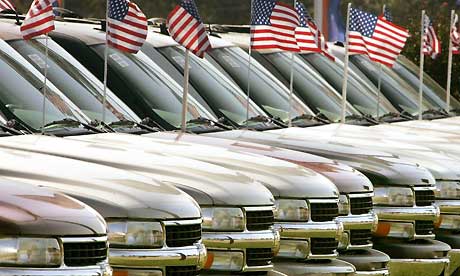The shrinkage of General Motors and Chrysler's dealer networks is putting more than 100,000 jobs in doubt at car yards in towns and cities across America GM's US sales chief, Mark LaNeve, said shedding dealers was a "difficult process", pointing out that he knew many of the victims personally. Photograph: AP The stricken car manufacturer General Motors has written to 1,100 US dealerships telling them that they are to be severed from the company's distribution network, leaving them with no vehicles to sell and an uncertain future. GM sent out the letters in the first stage of a streamlining that will eventually cut its network of US car showrooms from just under 6,000 to fewer than 4,400. Its move came a day after rival Chrysler announced it was shedding 789 of its 3,181 dealerships as it restructures its operations under bankruptcy protection. Taken together, the two Detroit manufacturers' shrinkage of their franchised dealer network put more than 100,000 jobs in doubt at car yards traditionally viewed as a staple part of the landscape in towns and cities across America. GM's US sales chief, Mark LaNeve, said shedding dealers was a "difficult process", pointing out that he knew many of the victims personally. "People could argue these actions should have been taken years ago but certainly, the management team today has no choice," said LaNeve, on a conference call with the media. Of GM's axed dealerships, about 500 specialise in Hummer, Saturn and Saab brands which the company has pledged either to sell or shut down. A further 400 to 500 car yards have negligible trade, shifting fewer than 35 vehicles annually, while the rest have fared poorly against performance benchmarks. Manufacturers argue that there are simply too many dealers fighting forshrinking demand from the US public, making the network inefficient. LaNeve said: "Dealers are not a problem to GM - they're an asset to GM. Too many dealers, in actuality, are a problem." For those cut loose, the options are limited. They can shop around for an alternative brand franchise, although few are available in the middle of the steepest slump in car sales since the second world war. Some will switch to selling used cars which, typically, are less profitable and support fewer jobs. Or they can shut down. One dealer, Mike Beattie of Dunlop Pontiac in Bay City, Michigan, was left pondering the prospects for his 27 staff. "It's a very difficult situation for all of us here - it's the end of an era," he says. "It's something we'd seen coming but we're still trying to wrap our heads around it." Beattie's dealership has dealt exclusively in sporty Pontiac cars since the nameplate was established in 1926. But cash-strapped General Motors recently axed the brand, long known for its "muscle car" image, as it slashed costs in a desperate effort to stave off bankruptcy. The outlook for Dunlop's 27 staff is cloudy because next year, the showroom will soon have nothing to sell. "I grew up with this business. My father had it before me," says Beattie. "We're a small organisation. I've been walking round, talking to my employees. We've got people who've worked here 40 or 50 years." Dealers are the latest to feel the pain from the struggles of Detroit's carmakers to stay afloat. Despite billions of dollars in emergency aid from the US government, Chrysler slipped into bankruptcy last month and GM has until the end of May to find a way to avoid a similar fate. The National Automobile Dealers Association said GM's cuts alone would hit 63,000 employees. The trade organisation said it viewed GM's move with "sadness and disappointment" and that "GM's decision comes through no fault of the dealers, who are, in many cases, family-run businesses that have been loyal partners with GM - through good times and bad - for multiple generations." Experts say that fewer retail outlets will ultimately mean less choice for consumers and, potentially, fewer discounts. Aaron Bragman, an automotive analyst at IHS Global Insight, said: "No longer will people be able to shop between three or four different dealers within 15 minutes of each other for the best cut-throat price."Industry crisis sees US car dealerships cut loose and left with nothing to sell

End of an era
Saturday, 16 May 2009
Posted by
Britannia Radio
at
18:50
![]()






















